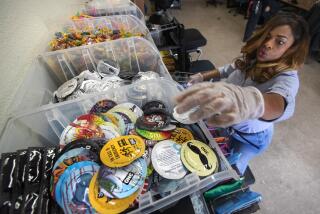YORBA LINDA : Condom Videotape Offered for Sale
- Share via
A Yorba Linda video producer is peddling an AIDS education videotape that uses a live model to demonstrate how to correctly put on and remove a condom.
Producer Michael Castillo is trying to sell the eight-minute videotape, titled “Condoms: They Can Save Your Life,” to school districts and AIDS education groups. He hopes eventually to have the video shown on cable television and available for public purchase and rental at video stores and libraries.
So far, however, he’s had only one buyer and was rejected by the Los Angeles Unified School District, which raised concerns over frontal nudity scenes and a lack of emphasis on abstinence.
Castillo says the explicit scenes, shot from the waist down, are necessary to make the point that next to abstinence, properly used condoms are the best way to prevent the spread of AIDS and other sexually transmitted diseases.
“I feel that it has to be placed in a real-life situation, because the kids are having sex with real-life people,” said Castillo, head of MC Video and Michael/Desmond Productions.
“I felt if parents could not go to their children and explain to them (about condom) use and the different types of condoms, they could watch this with their children. The bottom line is, we have to deal with the problem. Kids are going to have sex anyway. The word ‘virus’ has brought condoms out of the closet, if you will. They’re not a bad thing anymore.”
Planned Parenthood of Orange and San Bernardino counties has thus far been the only customer for Castillo’s tape. Carla Furtado, a Planned Parenthood community educator who has shown the tape during AIDS presentations at local colleges, said the video is “tastefully done” and more effective than the demonstration techniques educators have been using up to now, such as line drawings, cartoons and placing condoms over fingers or other objects.
“Certainly the video live action lends a clear demonstration on how to place a condom properly,” Furtado said.
“There have been a lot of questions about placing them on, and we want to reduce the risk of breakage and improperly placed condoms.”
But a committee of health education teachers in the Los Angeles Unified School District reviewed the video and rejected it on the basis of poor technical quality, lack of emphasis on abstinence and concern over the “explicit frontal nudity,” according to Sue Quinn, the district’s audiovisual services supervisor.
The videotape begins with a warning about the explicit information to follow and then opens with a couple kissing in bed. The woman asks the man what they should do about “protection,” which leads to a short conversation about safe sex.
The dramatization stops and a narrator warns that abstinence is the “sure way” to prevent the spread of diseases and pregnancy. Condom use is promoted as the next best protection.
Castillo, who worked several years as a medical assistant before starting his video production business 10 years ago, said he made the video because so many people remain uninformed about AIDS prevention.
He acknowledged he may have a tough time selling school districts on his tape, both because of the subject matter and the explicit imagery. “But why should we wait until AIDS infects more people . . . and kills more people?” he said.
More to Read
Sign up for Essential California
The most important California stories and recommendations in your inbox every morning.
You may occasionally receive promotional content from the Los Angeles Times.










